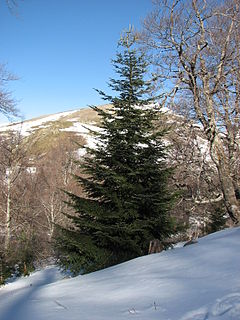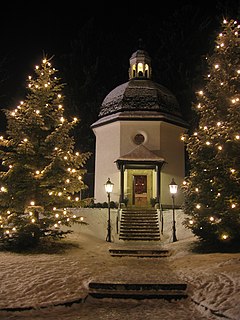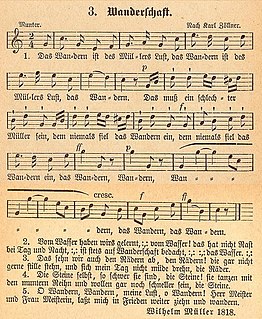 W
WBolle reiste jüngst zu Pfingsten is a folk song in the Berlin dialect. The song mocks the stereotype of Berliners as unrestrictedly revelrous.
 W
W"Ein Heller und ein Batzen" is a German folksong. Written by Albert von Schlippenbach in 1830 as a drinking song, it later became a popular marching song in the Wehrmacht during the Second World War.
 W
W"Die Gedanken sind frei" is a German song about freedom of thought. The original lyricist and the composer are unknown, though the most popular version was rendered by Hoffmann von Fallersleben in 1842.
 W
W"Geh aus, mein Herz, und suche Freud" is a summer hymn with a text in German by theologian Paul Gerhardt written in 1653. It was first published that same year in the fifth edition of Johann Crüger's hymnal Praxis Pietatis Melica. It was sung to several melodies, the most popular one composed by August Harder, and later became a Volkslied in an abridged version.
 W
W"Heidenröslein" or "Heideröslein" is a poem by Johann Wolfgang von Goethe, published in 1789. It was written in 1771 during Goethe's stay in Strasbourg when he was in love with Friederike Brion, to whom the poem is addressed. The episode is the inspiration for Franz Lehár's 1928 operetta Friederike, which includes a setting of "Heidenröslein" by Lehár.
 W
W"Ich hab die Nacht geträumet" is a German folk song. It is a melancholic song that tells of a disturbing dream foreshadowing death – a rosemary tree in the garden, falling leaves, and a jar broken to pieces and bleeding a red liquid. In Northern Germany, rosemary was planted in graveyards, and mourners at funerals would sometimes wear rosemary stalks.
 W
W"Kein schöner Land in dieser Zeit" is a popular Volkslied in German. It goes back to a song by Anton Wilhelm von Zuccalmaglio, first published in 1840 in a folk song collection. It gained popularity in the 1910s in the Wandervogel movement, and is now part of most song books in German. It has been set to choral music and modern songs. The beginning of the first line has been used as the title of books, a play and television series.
 W
W"Kommt ein Vogel geflogen" is a German-language Volkslied and love song from Lower Austria. While it was passed down orally, probably in dialect, some text first appeared in print in 1807. Six stanzas appeared in Posse mit Gesang by Karl von Holtei in Berlin in 1824 and made the song popular. In arrangements, it also became a children's song. Siegfried Ochs treated the melody humorously to variations for piano, imitating different styles of classical composers.
 W
WDer Kuckuck und der Esel is a well known old German children's song from the early 19th century. Its text was written by Hoffmann von Fallersleben in 1835, the melody (help·info) was already composed by Carl Friedrich Zelter in 1810. The song is about a singing contest between a cuckoo and a donkey.
 W
WThe Lorelei, also spelled Loreley in German, is a 132-metre-high (433 ft), steep slate rock on the right bank of the River Rhine in the Rhine Gorge at Sankt Goarshausen in Germany, part of the Upper Middle Rhine Valley UNESCO World Heritage Site. The 1930s Loreley Amphitheatre is on top of the rock.
 W
W"Der Mond ist aufgegangen" is a German lullaby and evening song by Matthias Claudius, one of the most popular in German literature. Also known under the name Abendlied it was first released in Musen-Almanach in 1779, published by Johann Heinrich Voß. In 1783, Claudius published the poem with a modification to verse six in Asmus omnia sua secum portans oder Sämmtliche Werke des Wandsbecker Bothen IV. Theil.
 W
W"O Tannenbaum" is a German Christmas song. Based on a traditional folk song which was unrelated to Christmas, it became associated with the traditional Christmas tree by the middle of the 19th century and sung as a Christmas carol.
 W
W"Silent Night" is a popular Christmas carol, composed in 1818 by Franz Xaver Gruber to lyrics by Joseph Mohr in the small town of Oberndorf bei Salzburg, Austria. It was declared an intangible cultural heritage by UNESCO in 2011. The song has been recorded by many singers across many music genres. The version sung by Bing Crosby in 1935 has sold 10 million copies as a single.
 W
W"Süßer die Glocken nie klingen" is a popular German Christmas carol with text by Friedrich Wilhelm Kritzinger to a traditional Volkslied melody, first printed in 1860. It has remained popular and is part of many song books and Christmas recordings, evoking the sound of bells as a symbol of peace and joy.
 W
W"Das Wandern ist des Müllers Lust" is the first line of a poem by Wilhelm Müller, written in 1821 with the title "Wanderschaft" as part of a collection, Die schöne Müllerin. While wandern is defined as "hiking" today, it referred to the required journeyman years of craftsmen when written, in this case of a miller.
 W
W"Weißt du, wie viel Sternlein stehen" is a German lullaby and popular evening song. The lyrics were written by the Protestant pastor and poet Wilhelm Hey (1789–1854), who published them first in 1837. The melody is recorded back to 1818. A poetic English translation of the first and third verse is by Henry William Dulcken (1832–1894).
 W
W"Das zerbrochene Ringlein" is a poem by Joseph von Eichendorff, which can be found also titled as Lied, first published 1813 by Justinus Kerner et al. in the almanac Deutscher Dichterwald under the pseudonym "Florens" and afterwords in his novel Aus dem Leben eines Taugenichts. 1807/08 Eichendorff pondered in his diaries about his unhappy love affair with Käthchen Förster, the daughter of a Heidelberg cellarman, during his student days. This fact is remembered by a memorial stone at the Philosophenweg in Heidelberg, along the Neckar.